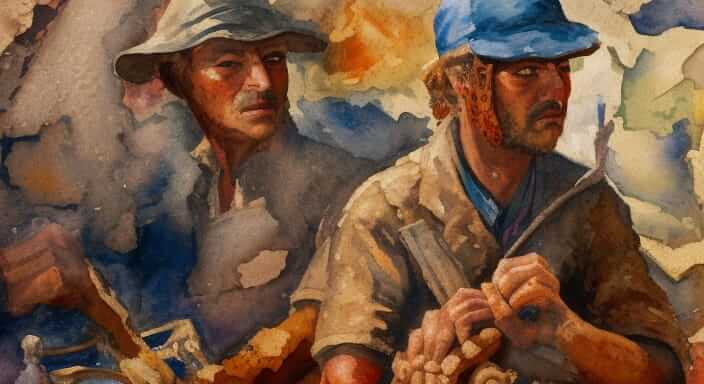Arkeolog mesleğinin, Archaeologist mesleğinin ingilizce olarak tanıtımı. İngilizce Arkeolog, Archaeologist işe yapar, açıklaması.

İngilizce Arkeolog Mesleğinin Tanıtımı (Archaeologist)
What is an Archaeologist?
Most people’s understanding of archaeology comes from TV shows like Indiana Jones. Unfortunately, there is very little Indiana Jones style adventure in archaeology. Although archaeologists do get to travel to cool places, what they are really looking for is information, not treasure.
Archaeology is one of the main sources we have to unearth history and to piece together the people and cultures that make us who we are today. It is the scientific study of the human past, and is one of the four sub-fields of anthropology.
Archaeologists study the origin, development, and behaviour of human beings and their societies, both past and present. They examine cultures, languages, behaviours, archaeological remains, and physical characteristics of people in many parts of the world. They ask questions and develop theories.
Who are they and what do they do?
Archaeologists are professionals who specialize in the scientific study of the past through the analysis and interpretation of material remains left behind by ancient civilizations and cultures. Here is an overview of who they are and what they do:
- Who are archaeologists?
- Archaeologists are individuals who have received formal education and training in archaeology, which is a subfield of anthropology.
- They can hold various academic degrees, such as bachelor’s, master’s, or doctoral degrees in archaeology or related disciplines.
- Archaeologists may have different specializations, such as classical archaeology, prehistoric archaeology, historical archaeology, underwater archaeology, or forensic archaeology.
- What do archaeologists do?
- Conducting Excavations: One of the primary activities of archaeologists is conducting excavations at archaeological sites. They carefully dig, document, and recover artifacts and other material remains buried in the ground.
- Analyzing Artifacts: After excavation, archaeologists analyze the artifacts and objects they find. They study the characteristics, functions, and cultural significance of these items to understand the behaviors and practices of past societies.
- Interpreting Sites: Archaeologists interpret the information gathered from excavations to reconstruct the history, social organization, technology, and cultural practices of the societies that once inhabited the sites.
- Dating Techniques: They use various dating methods, such as radiocarbon dating, to determine the age of artifacts and sites, providing a chronological framework for understanding past events.
- Cultural Resource Management: In some cases, archaeologists work in cultural resource management, which involves assessing and preserving archaeological sites before construction projects or developments take place.
- Research and Publications: Archaeologists publish their findings in academic journals and present them at conferences, contributing to the body of knowledge in archaeology.
- Collaboration: Archaeologists often collaborate with historians, anthropologists, geologists, and other experts to gain a comprehensive understanding of the past.
- Preservation and Conservation: They advocate for the preservation and protection of archaeological sites, artifacts, and cultural heritage.
- Public Outreach: Many archaeologists engage in public outreach and education programs, sharing their discoveries and knowledge with the broader community.
- Teaching: Those in academia may also teach archaeology courses at universities and colleges, passing on their expertise to the next generation of archaeologists.
Overall, archaeologists play a vital role in unearthing and interpreting the past, contributing to our understanding of human history, culture, and evolution. Their work helps us connect with our ancestors, appreciate our cultural heritage, and learn from the achievements and mistakes of past societies.

What are the activities of the job?
The activities of an archaeologist’s job can vary depending on their specific area of specialization and the nature of their work. However, here are some common activities that archaeologists engage in:
- Site Surveys: Archaeologists may conduct surveys to identify potential archaeological sites. This involves walking or using remote sensing technologies to locate surface artifacts or anomalies that may indicate buried structures or artifacts.
- Excavation: One of the fundamental activities of archaeologists is excavation. They carefully dig and remove layers of soil to expose and recover artifacts, features, and structures buried at archaeological sites.
- Artifact Analysis: Archaeologists clean, classify, and analyze the artifacts they uncover during excavations. They study these objects to understand their function, cultural significance, and dating.
- Site Mapping: Archaeologists create detailed maps and plans of archaeological sites to record the spatial distribution of artifacts, features, and structures.
- Dating Techniques: They use various dating methods, such as radiocarbon dating, dendrochronology (tree-ring dating), or thermoluminescence dating, to determine the age of artifacts and sites.
- Contextual Analysis: Archaeologists interpret the context in which artifacts and features are found to understand their relationship to each other and the site’s overall history.
- Documentation: Archaeologists document their findings meticulously through notes, photographs, drawings, and digital recording.
- Laboratory Analysis: Some artifacts and samples require further analysis in laboratory settings. Archaeologists may use specialized equipment to study materials like pottery, metals, or plant remains.
- Research and Writing: Archaeologists engage in extensive research, review existing literature, and develop theories and hypotheses based on their findings. They then communicate their research through academic papers, reports, and publications.
- Conservation and Preservation: Archaeologists collaborate with conservators to ensure that artifacts and structures are preserved properly after excavation.
- Cultural Resource Management: In some cases, archaeologists work with government agencies and developers to assess the impact of construction projects on archaeological sites and advise on preservation and mitigation measures.
- Public Outreach: Archaeologists engage in public outreach and educational programs to share their discoveries and promote awareness and appreciation of archaeology and cultural heritage.
- Teaching and Mentoring: Those in academia may teach and mentor students in archaeology and related fields.
It’s important to note that archaeologists often work as part of a team, collaborating with other professionals and experts in various disciplines to gain a comprehensive understanding of the archaeological sites and their cultural context. The work of an archaeologist is diverse, and they may be involved in a combination of fieldwork, laboratory analysis, research, teaching, and public engagement.